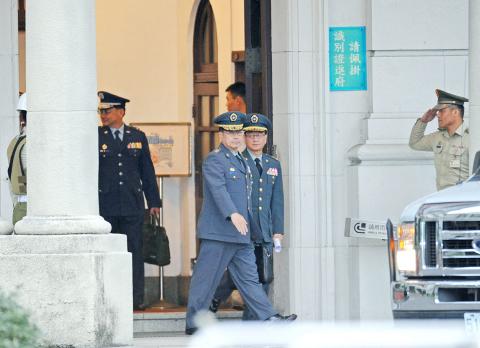President Ma Ying-jeou (馬英九) yesterday punished Chief of the General Staff Yen Teh-fa (嚴德發) with one demerit and Army Commander General Chiu Kuo-cheng (邱國正) with two demerits following an outcry over visits on March 29 by unauthorized civilians to a restricted-access base housing US-made AH-64E Apache helicopters.
According to a press release issued by the Presidential Office last night, Ma said the visit to the 601st Air Cavalry Brigade base in Taoyuan’s Longtan District (龍潭) falls under the purview of Yen and Chiu and that their “lack of supervision” demonstrated a lack of military discipline that compromised military security.
Led by Minister of National Defense Kao Kuang-chi (高廣圻), Yen, Chiu and other military officials presented a report to Ma on a recent spate of military scandals after the military conducted a review involving all units on Tuesday.

Photo: CNA
Kao offered to resign to take responsibility for the Apache incident, but Ma asked him to stay to strengthen discipline and maintain morale in the military, Presidential Office spokesperson Charles Chen (陳以信) said.
Deputy ministers of defense Liu Chen-wu (劉震武) and Chen Yung-kang (陳永康), Navy Commander Admiral Li Hsi-ming (李喜明), Air Force Commander General Shen Yi-ming (沈一鳴), Reserve Forces Command Headquarters Chief of Staff Lieutenant General Bi Hsueh-wen (畢學文) and Military Police Commander Lieutenant General Wu Ying-ping (吳應平) were also present at the meeting at the Presidential Office Building.
Earlier in the day, the ministry announced more punishments, focusing on Lieutenant General Chen Chien-tsai (陳健財), who was removed from his post as commander of the Army Special Forces Command’s Airborne Headquarters.
Taking blame for the fallout and security lapses arising from the unauthorized civilian visits, Chen Chien-tsai has been demoted and transferred to a non-supervisory post as a consultative member at the Army Command Headquarters (ACH) office.
“Chen Chien-tsai did not fulfill his responsibility as the commander in charge of the unit, and did not conduct the suitable followup work on the incident,” ministry spokesman Major General David Lo (羅紹和) said.
“Major General Chien Tsung-yuan (簡聰淵), commander of the 601st Air Cavalry Brigade, was also removed from his post, and transferred to ACH as a consultative member. If the two officers do not take up other military posts within a year, by military regulations, they will be forced to retire,” Lo added.
The Army Special Forces Command Airborne Headquarters, which was headed by Chen Chien-tsai, has direct jurisdiction over the 601st and 602nd Air Cavalry Brigade, among other specially trained elite units, including paratroopers, amphibious fighting battalions, reconnaissance helicopter and attack helicopter operation units.
The 601st and 602nd brigades, based in Taoyuan’s Longtan District and Taichung’s Sinshe (新社) respectively, are the two units responsible for the service and operation of the helicopters, the last of which were delivered in October last year.
A total of 61 Bell AH-1W Super Cobra attack helicopters, obtained from the US in arms procurement packages during the 1990s, are also deployed at these two brigades.

RESILIENCE: Deepening bilateral cooperation would extend the peace sustained over the 45 years since the Taiwan Relations Act, Greene said Taiwan-US relations are built on deep economic ties and shared values, American Institute in Taiwan (AIT) Director Raymond Greene said yesterday, adding that strengthening supply chain security in critical industries, enhancing societal resilience through cooperation and deepening partnerships are key to ensuring peace and stability for Taiwan in the years ahead. Greene made the remarks at the National Security Youth Forum, organized by National Taiwan University’s National Security and Strategy Studies Institution in Taipei. In his address in Mandarin Chinese, Greene said the Taiwan-US relationship is built on deep economic ties and shared interests, and grows stronger through the enduring friendship between

GAINING STEAM: The scheme initially failed to gather much attention, with only 188 cards issued in its first year, but gained popularity amid the COVID-19 pandemic Applications for the Employment Gold Card have increased in the past few years, with the card having been issued to a total of 13,191 people from 101 countries since its introduction in 2018, the National Development Council (NDC) said yesterday. Those who have received the card have included celebrities, such as former NBA star Dwight Howard and Australian-South Korean cheerleader Dahye Lee, the NDC said. The four-in-one Employment Gold Card combines a work permit, resident visa, Alien Resident Certificate (ARC) and re-entry permit. It was first introduced in February 2018 through the Act Governing Recruitment and Employment of Foreign Professionals (外國專業人才延攬及雇用法),

The Ministry of Transportation and Communications yesterday said that it would redesign the written portion of the driver’s license exam to make it more rigorous. “We hope that the exam can assess drivers’ understanding of traffic rules, particularly those who take the driver’s license test for the first time. In the past, drivers only needed to cram a book of test questions to pass the written exam,” Minister of Transportation and Communications Chen Shih-kai (陳世凱) told a news conference at the Taoyuan Motor Vehicle Office. “In the future, they would not be able to pass the test unless they study traffic regulations

EUROPEAN TARGETS: The planned Munich center would support TSMC’s European customers to design high-performance, energy-efficient chips, an executive said Taiwan Semiconductor Manufacturing Co (TSMC, 台積電), the world’s largest contract chipmaker, yesterday said that it plans to launch a new research-and-development (R&D) center in Munich, Germany, next quarter to assist customers with chip design. TSMC Europe president Paul de Bot made the announcement during a technology symposium in Amsterdam on Tuesday, the chipmaker said. The new Munich center would be the firm’s first chip designing center in Europe, it said. The chipmaker has set up a major R&D center at its base of operations in Hsinchu and plans to create a new one in the US to provide services for major US customers,